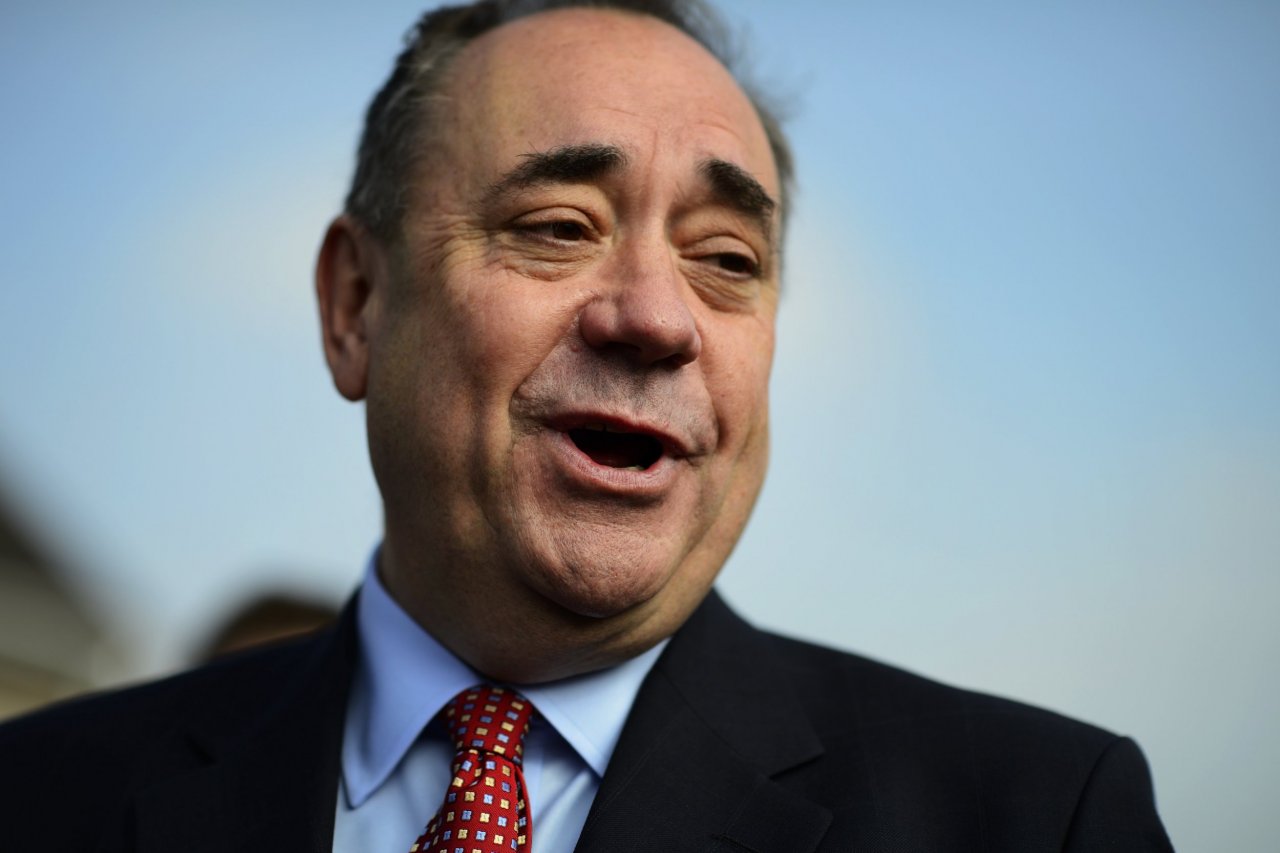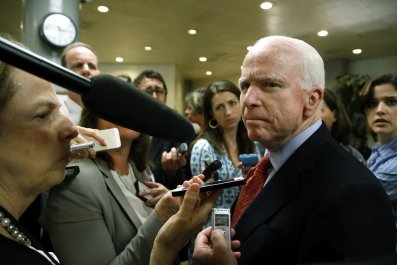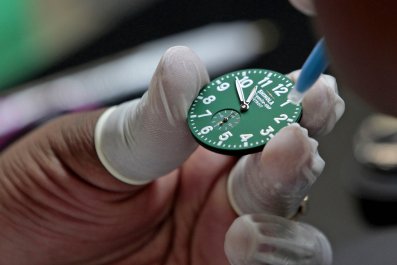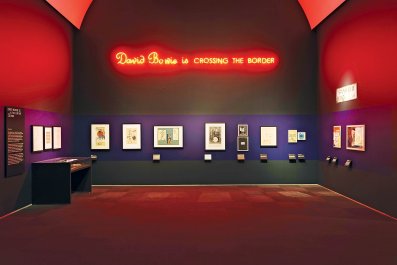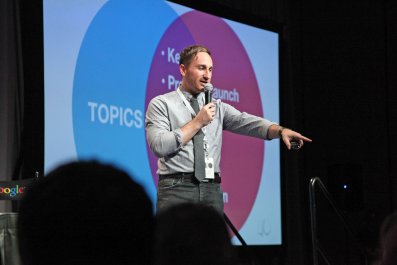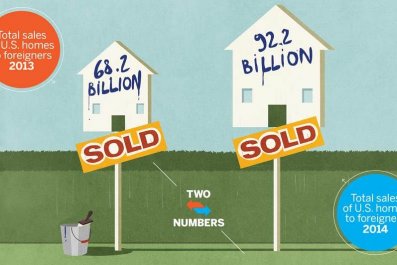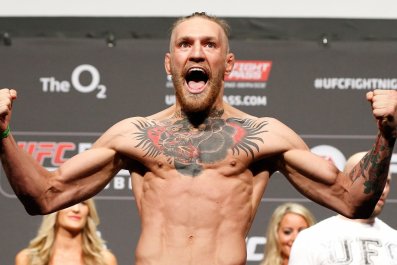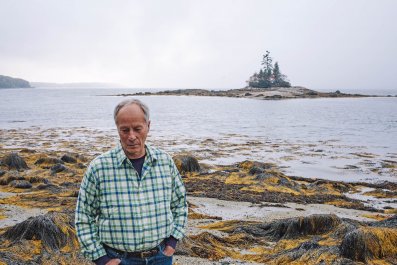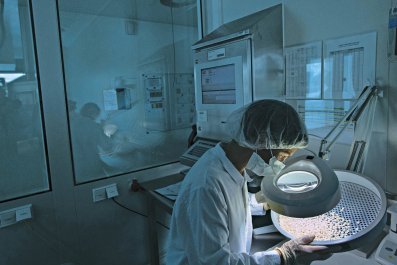Alex Salmond, leader of the Scottish Nationalists for 20 of the past 24 years, first non-Labour politician to head up his nation's government, disrupter and scourge of the British establishment, is stepping down. And he looks ready for a break.
Long months of shaking hands with crowds have left him with a painfully strained right arm, now in a brace, and he has to offer his left. It's awkward. As we settle down for this valedictory interview, Salmond, whose usual persona is one of irrepressible defiance, talks about handing over the leadership of Scotland and of his party to Nicola Sturgeon, his 44-year old long-term deputy, as "a generational shift", as if he felt much older than his 59 years.
But in the topsy-turvy world of British politics, where each week brings a fresh crisis for the main parties and their embattled leaders, this outgoing champion of Scottish secession could still be the greatest threat to the British state in a landscape littered with electoral and constitutional booby-traps. The new challenger, the UK Independence Party leader Nigel Farage, is rewriting the script for next year's general election in England, taking enough votes (and some defecting MPs) from the Conservatives to be blowing David Cameron off course and possibly out of Downing Street. Salmond's SNP is its mirror image north of the border.
Traditional Labour voters in Scotland have flocked to the Nationalists, leading to fears in Ed Miliband's party that he cannot hold enough of the party's crucial Scottish redoubts to form a government – or even claim to represent the whole of the United Kingdom. Whispered threats of a putsch against Miliband are swirling in the same week as the SNP convenes to celebrate its surge in popularity – polls suggest as many as 52% of Scots now intend to vote for the party's prospective MPs next May.
Salmond's bravura performance in September's independence campaign narrowly failed to convince his countrymen and women to break away, but the 'Yes' campaign had a chance of winning that was strong enough to terrify London. And the losers are starting to look as if they might have won. Dramatic levels of devolution were promised and now have to be delivered; the SNP are emerging as possible power–brokers in the next Westminster parliament if neither of the main parties can form a government alone; and hanging over it all is Cameron's promise of a referendum on Britain's membership of the EU, which Salmond reveals as a possible 'Plan B' in his lifelong mission to reverse the 1707 Act of Union.
There's an opening quip about announcing to Newsweek that he has changed his mind about leaving, a call for reviving tea on this bright, icy morning ("hot please!"), and we're off on a tour of the political horizon that takes in how a 'Brexit' could allow the Scots to stay in the EU but be free of London control; the inadequacies of the rest of Britain's political leaders; and how Scotland's separatists can profit from another hung parliament. There is also time for a rummage in the cupboards of Bute House, the Georgian mansion in one of Edinburgh's grandest New Town squares that has served as the official residence for first ministers since devolution in 1999.
Throughout, Salmond's unique mix of pugnaciousness and jocularity is on show. But his constant preoccupation with strategy, as he analyses every fresh set of circumstances thrown up by the current political tumult, shows why Salmond is feared by political opponents. They consistently make the mistake of underestimating him – a few days ago, Cameron dismissed his separatist foe as "living in a perpetual episode of Braveheart".
Far from killing off the hopes of Salmond's independence dream, as unionist devolution reformers believed, the creation of a Scottish parliament and executive during Tony Blair's premiership has led, within a relatively short period, to an SNP majority government in Scotland, a worryingly close result in the recent vote on whether to secede from the UK (55% to 45% opted to stay in), and a population north of the border who tell pollsters they would vote to leave if the referendum was held again tomorrow, by 49% to 45% according to YouGov (excluding the don't knows).
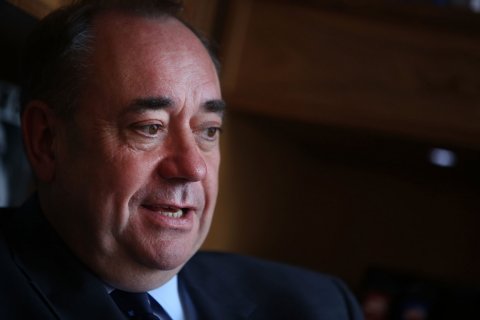
"Hey, there's an idea! Have I got time to do that?" Salmond jokes to the aide trying to organise his frantic final days in office. In reality, a fresh referendum, which would now be masterminded by Sturgeon, could only happen in exceptional circumstances. But with a fresh set of elections to the Scottish parliament in 2016, that referendum on EU membership promised before 2017, and the most unpredictable general election in living memory now less than six months away, those exceptional circumstances could be at hand.
So there is another decision meanwhile, and a very real one, pressing in on the party's outgoing leader: whether to stand in the May 2015 general election for a constituency in or around his home district of Aberdeenshire in the north east of Scotland.
Back in the Closet
Mulling a return to the House of Commons, at the head of a stronger contingent of SNP Members of Parliament than ever before, Salmond feels a strong need to put pressure on the other UK parties to make good a commitment formed in the last few weeks of the referendum campaign: to grant Scotland maximum devolution of powers in double-quick time.
"It will only happen if it's forced to happen," Salmond warns. "If Westminster got the slightest opportunity to put this back in the closet, back in the closet it will go."
But even devo-max, as the settlement a few steps short of independence is known, is not the SNP objective: that remains leading Scotland out of the union to become a separate nation state. He has unfinished business, then?
"Correct," clips Salmond. And he delivers the first of many steely glares that punctuate the jollity. To a visiting English unionist, these are downright disconcerting – Salmond has earned a reputation for resilience in playing the long game but also as a superb, direct communicator. He is often coupled together with Boris Johnson, maverick Tory Mayor of London and the anti-EU Farage by commentators – all three have a convincing rapport with sections of the public at a time when most of Britain's political leaders appear remote and inauthentic. All three men, of course, also repel where they do not attract.
"The SNP and Ukip are as far apart as two parties can possibly be," he insists. "But there is one common thread that is of course visceral contempt for the Westminster establishment, which was a strong motivation in the referendum campaign."
Scathing verdicts are delivered on other opponents: the Prime Minister exposed himself as a 'schoolboy' with his accidentally-taped boast about the Queen 'purring' at him when he told her the realm would remain united, says Salmond.
He believes Cameron to be disastrous for the country but probably not his own party; Ed Miliband, though, is "just disastrous – for the party and the country".
The Chancellor of the Exchequer, George Osborne, receives the grudging, mistrustful respect of one military commander for another, delivered with a reflective bit of chin–rubbing: "Osborne is clever." As a tactician? "Yeah . . . You wouldn't want to go into the jungle with him."
Salmond's first spell as a young MP was during the Thatcher premiership, when he gained notoriety, and valuable publicity for the independence cause, with stunts like interrupting the Budget speech, traditionally heard in respectful silence. As a result he was temporarily suspended from the Commons, to his party's delight and benefit. But in spite of being dubbed an 'infant Robespierre' by the then Scottish secretary Malcolm Rifkind, Salmond is no revolutionary. A gradualist, he convinced his party to ride the incoming tide of devolution to achieve its own -secessionist ends, and successfully ignored the wilder, anti-monarchy preoccupations of some in the SNP ranks. Now, though, anyone in his presence will get the feeling he believes the time has come for what he calls "conventional politics", which is undergoing a crisis of public trust, to give way.
Preoccupied with their own distracting internal conflicts, do either of the potential next prime ministers, Cameron or Miliband, grasp what might be coming?
"I think that in Westminster politics, particularly in a complex three party inter–relationship with two parties in coalition, there is a great tendency to see 'this is my next move on this particular chessboard' without realising that somebody might just be getting the chessboard and going 'whoosh'." He mimes tossing the board into the air. "They don't see that the whole world is changing."
As we talk Salmond is days away from delivering his farewell speech to the SNP party faithful – swollen dramatically in number to more than 80,000 since September's plebiscite and dwarfing Labour's 13,000 north of the border. His speech is not yet penned, he says airily, although well into his last few days as leader of Scotland's government.
"I always do these things at the last minute."
He insists he isn't being coy about whether he will go back to the Commons – "I'm not teasing, I just haven't made up my mind."
But the decline of the three main UK parties, in terms of membership and vote share at elections, together with a particularly auspicious moment for any smaller party seen by an angry, disillusioned public to be challenging the status quo, make the next House of Commons a superb arena for the SNP to push Scotland's priorities.
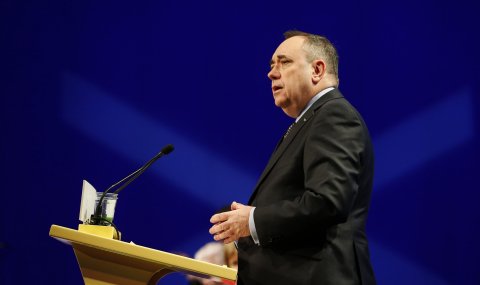
Salmond, who sat on the green benches from 1987 to 2010 and headed the SNP's parliamentary group there during the four years he stood aside as party leader, is clearly tempted – it could be where the deal-making action is next time.
In 2010, he had hoped to "make Westminster dance to a Scottish jig". But in the end that inconclusive election result left the SNP no stronger at only six seats. The Conservatives, as the largest party, were able to form a UK coalition with the Lib Dems.
Now opinion polls show the SNP on course to be the largest bloc of Scottish MPs in the Commons, with Labour reduced to a rump in single figures. Miliband is facing a rout even in his party's Caledonian heartlands, many of which voted 'Yes' in the referendum: it could be the decisive factor in keeping him out of power.
"You've got the two main parties effectively throwing the election at each other, the one with a fracturing on the right, the other with a highly deficient leader. Any sensible group of people facing these circumstances, and by and large the English electorate is pretty sensible, is unlikely to give any of these two an absolute majority. I find it difficult to believe that either the Conservatives or Labour are fit to win an election."
Pitch to the English
So far, so much in line with the consensus of most commentators and opinion pollsters with only six months to go until this strange and unpredictable general election. But then an intriguing note creeps in, with Salmond appearing to make a pitch to the English about the SNP's fitness to hold the balance of power in a hung parliament.
Pitching himself forward into a sitting sumo pose, hands clasped and feet apart, the First Minister argues he could use SNP votes at Westminster to support policies that help not only Scotland but northern England, where people also say a remote political establishment in the comparatively prosperous southeast has not dealt with them fairly.
"It's likely there is a potential route of progress through Westminster, which has not been the usual circumstance before. Who knows, there might be one or two things we can knock off for the good citizens of Liverpool and Newcastle, because they badly need a champion of some sort."
This game, imagining a post-election world in which he might exercise such influence, clearly amuses him greatly. The dark eyes are twinkling.
"Listen, is England going to be safer in my hands or in the hands of this coalition government or of Nigel Farage? Much safer in my hands. I'll do my best."
But how could he achieve these deals and how provide this service he seems, only half in jest, to be offering the whole of the UK? A coalition? Certainly not with the Tories.
"Every single political organisation that has ever gone into an alliance, agreement or cohabitation with the Conservative party has ended up destroyed. The Liberal Democrats will be exactly the same and I'm about to demonstrate this from history."
Ever the enthusiastic historian, the First Minister calls for a tray from among the ceremonial silver, explaining that Bute House, leased to the Scottish administration by the National Trust for Scotland, has been difficult to maintain during austere times, but a fantastic site for digging up hidden treasures: "I came across some wonderful things in cupboards when I moved into this house."
The splendid artefact is brought out – an elaborately engraved rendition in silver of the Forth bridge, presented by Conservative Prime Minister Harold Macmillan in 1958 to the then Secretary of state for Scotland, John Scott Maclay.
"He was a Liberal. A National Liberal," explains the First Minister – the National Liberals split from the main Liberal Party for a brief period between the 1920s and 1960s, and eventually got absorbed into the Conservative party. "Harold Macmillan appointed him I think out of a sense of mischief. And he was the last of his kind, the last National Liberal in Scotland."
Stage business over, he delivers the lesson: those who "give succour" to the Tories have all been "swallowed by the whale".
"And you can be absolutely certain that my colleagues, whether or not aided and abetted by my presence, will not be being swallowed by that particular whale."
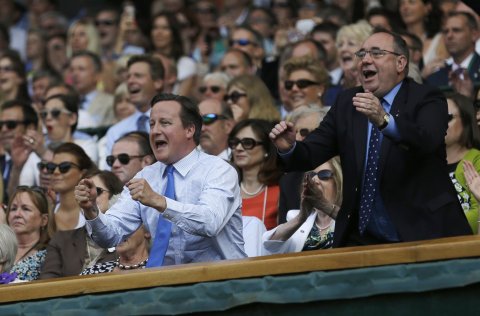
Given the SNP's long-term decision to opt out of most House of Commons votes on matters that affect England and Wales, their "self-denying ordinance" that could equate to the English votes for English laws' being demanded by some backbenchers, what about a looser arrangement to prop up a minority government?
"A confidence and supply agreement is a possibility," Salmond muses – he has clearly thought through all the possible permutations and was on the receiving end of other parties attempts to disrupt his own minority administration at Holyrood between 2007 and 2011. He has studied all the tricks.
"Devils," he snorts. "I took careful notes . . . There is plenty of scope to find things which are really important to you but are really not that important to the government.
"It wouldn't be the greatest tragedy in the world, for example, for Westminster to accept the reality that the Scottish parliament should run its own elections, its own referendum."
I look aghast at the idea: an SNP administration in Scotland having control of the question, timing and rules around another referendum. That would mean the existential threat to the UK multiplied, surely?
"Not of immediate pressing concern compared to the enormity, for example, of Ed Miliband's survival as Prime Minister, which I am sure he would in that situation believe to be of the ultimate importance to the future of everything."
Now the game we are playing has got serious: hung parliament hardball, with a wily Salmond facing a Prime Minister at bay.
Rebel With a Cause
On November 5th this year, the night when bonfires and firework parties celebrate the discovery and thwarting of Guy Fawkes' plot to blow up the Houses of Parliament in 1605, an effigy of Alex Salmond was burnt at the biggest of the traditional celebrations, in Lewes on the south coast of England.
Salmond brushed off the insult – meant in the spirit, the organisers claimed, of the event's long tradition of political satire. But it is difficult not to conclude, sitting with him as he ponders his party's next move that, however exhausted by the recent campaigning, this particular rebel has far from given up the fight to rupture the UK: he is just viewing it from a different angle.
After receiving a few of these trademark Salmond stares whenever England or the English are mentioned, even the genteel surroundings of a Georgian drawing room in staunchly pro-union Edinburgh can feel like a dangerous place.
Gordon Wilson, a former leader of the SNP, while critical of Salmond's failure to win the economic arguments during the independence campaign, writes in a recent book that while the 'No' side won September's battle, the Nationalists "arguably won the war" because "the referendum ignited a long constitutional fuse which could blow Westminster apart".
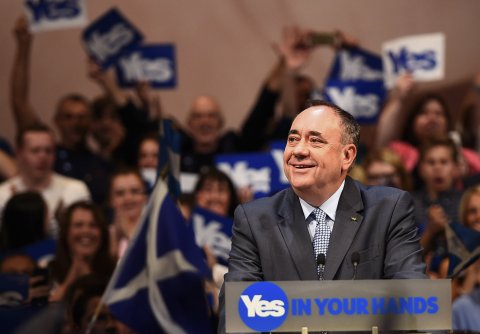
Labour and the Tories were bickering internally and with each other about the consequences of the 'No' vote within hours of the result. Dramatic devolution of powers to Scotland is now being negotiated in double-quick time by a cross-party commission. But the ensuing row about powers for the English regions could push even more votes in the direction of Nigel Farage's Ukip next May; far from being the end of something, the plebiscite has already prompted calls for powers in Wales and England's northern cities, with more disruption to come.
Scotland's vote has certainly been "a catalyst for wider change" admits Salmond, but for him it's a sideshow. "I didn't really come into politics to be the man who changed England, though there are many people who think that England needs changing."
If something close to home rule is delivered, the discontent currently buoying up the SNP in the opinion polls may not last. But Salmond and Sturgeon will enjoy characterising any setbacks as a plot against the Scots, and the extraordinary spectacle of mass participation during the referendum, culminating in an astonishing near 85% turnout on the day, demands the 'Yes' campaign still be heard.
"This is the most engaged, the most energised electorate in Western Europe now, and any Westminster politician who thinks they can be left to go meekly back to their box for the convenience of the Westminster establishment – well, they probably already realise that's not what's happening."
What they may not realise, or not fully, is the extent to which Salmond may be preparing to work from the Commons in concert with Nicola Sturgeon in Holyrood to exploit Cameron's promise of a referendum on EU membership. In this 'Plan B' any boost to the self-government of Scotland will help. "Nicola is preparing the ground for a blocking position. If we are in this quasi-federal position then each of the constituent parts [of the UK] has to decide to jump out together. Not one part saying 'right, I'm jumping out, you lot, you're just coming wi'us. And you know, if Westminster doesn't like that, there's an obvious solution."
This last threat ends with the hardest, longest and fiercest glare yet – an EU referendum in which England voted for 'out' but Scotland voted for 'in' could provoke a crisis that achieves independence by the back door.
Sturgeon, who Salmond terms his "apprentice", pops in, impeccably turned out, tiny, and, like many successful leaders, without the automatic ingratiating smile that plagues many women's careers. We all stand but Salmond sits down again then banters with her from his armchair. An anthropologist would have a field day with the status markers in this primate group. The deputy first minister withdraws, leaving her mentor to his peroration.
Cameron's predicament over the EU is folly on the Prime Minister's part, the pro-EU Salmond believes. "It's one thing having a referendum because you want to achieve something, quite something else having a referendum on something you don't want to achieve: that's almost ridiculous!"
But the EU itself, he claims, has "lost its way" by prioritising the internal market ("In a sense, Thatcher won, didn't she?") An earlier agenda that emphasised social protections – workers' rights for example – might have made it more emotionally appealing to ordinary European citizens. "Instead of being the punchbag of every piece of negativity across the continent, Europe should be saying these are the themes we think are important."
There is little evidence to support the idea that this sales pitch for the EU would be more likely to appeal to the average English voter in a referendum. But it might work in Scotland, where the political spectrum is centred further to the left – any split in the vote, England out, Scotland and Wales in, could be the SNP's next big opportunity.
Salmond is famous for his love of gambling, and this is an audacious punt. But in the febrile world of British politics, where all the usual bets are off, longterm outsiders like the SNP, and insurgents like Ukip are spotting the chance to force their own agenda.
"What happens," Salmond asks, "when 85% of people speak and of that 85% many of them roared and of the ones that didn't roar, many of them think, hmm, maybe we should have?"
The Scots, their hopes now raised, will not, he warns, "disappear back into the shadows". And nor, clearly, will Alex Salmond, whether he's the man in charge or, from now on, a strategic mastermind behind the curtain. London, you have been warned.



